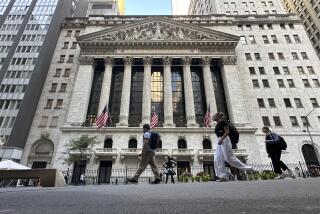Slowing of Economy Suggested
The index of leading U.S. economic indicators fell in September for the first time in six months, supporting forecasts that the economy will slow from the third quarter, a private research group said Monday.
The 0.2% decline in the New York-based Conference Board’s gauge of how the economy will perform over the next three to six months followed a 0.4% increase in August.
Six of the 10 indicators the Conference Board uses to derive its forward-looking index declined in September. Leading the decrease was a decline in the money supply, followed by a narrower spread between the yield on the 10-year Treasury note and overnight loans, which can be used as a gauge of the direction of interest rates.
“The drop in money supply probably reflects banks’ sales of Treasuries -- their holdings have fallen by more than $100 billion since late July,” wrote Ian Shepherdson, chief U.S. economist for High Frequency Economics in Valhalla, N.Y.
The Conference Board assigns different weights to each of the indicators and derives the index by adding or subtracting the changes from month to month. Seven of the 10 components are known before the report, and the Conference Board estimates the remaining three.
The Conference Board’s index of coincident indicators, a gauge of current economic activity, rose 0.1% in September after no change in August. The gauge tracks payrolls, incomes, sales and production.
The index of lagging indicators, which includes measures such as duration of unemployment and the ratio of installment credit to consumer income, fell 0.5% last month after no change the month before.
The spread between the yield on the 10-year Treasury note and the Federal Reserve’s target rate of 1% on overnight loans between banks narrowed to 2.94 percentage points at the end of the month from 3.6 percentage points at the beginning.
Other negative influences: faster vendor deliveries, a decline in consumer confidence, fewer building permits and an increase in the number of Americans filing for unemployment insurance.
The four positive influences on the index were a longer workweek, higher stock prices and increases in orders for consumer goods and business equipment.
More to Read
Inside the business of entertainment
The Wide Shot brings you news, analysis and insights on everything from streaming wars to production — and what it all means for the future.
You may occasionally receive promotional content from the Los Angeles Times.










